Battlefield: Mahabharata’s iconic sequel set for India debut
Imagine a blonde Yudhishthira and an African Bhima. We look back at Peter Brook’s iconic Mahabharata stage adaptation. And look forward to its sequel this weekend
“Main samay hoon...” Three words from an omniscient narrator (voiced by actor Harish Bhimani) had India glued to TV screens.
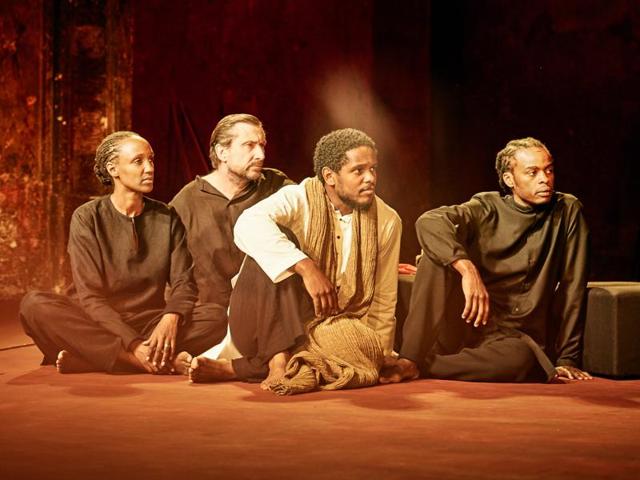
This was the late ’80s (1988 to 1990), and arguably India’s most iconic TV series, BR Chopra’s Mahabharat, a 94-episode saga that aired on DD National every Sunday morning. With a production cost of `9 crore, it was the grandest adaptation of the Mahabharata India had seen until then. It was so popular that even BBC UK aired it to its 5 million viewership base from 1991 to 1993, the Guardian reported.
But three years before this TV series, the small French town of Avignon witnessed the Indian epic as the theatrical spectacle, Le Mahabharata, directed by Peter Brook. It premiered at Festival d’Avignon — France’s oldest, and one of its most prestigious, theatre festivals.
The nine-hour play opened as the evening dawned upon Avignon, and ended at sunrise. It was set in a specially created amphitheatrical stone-quarry, with 250 tonnes of sand and 140 tonnes of clay. The cast comprised 25 actors from 16 countries (imagine a blonde Yudhishthira and an African Bhima). They brought to life the 3,000-year-old Sanskrit epic, in French. Translated by author Jean-Claude Carrière, it was the first theatre production as well as the first foreign language adaptation of the complete epic.
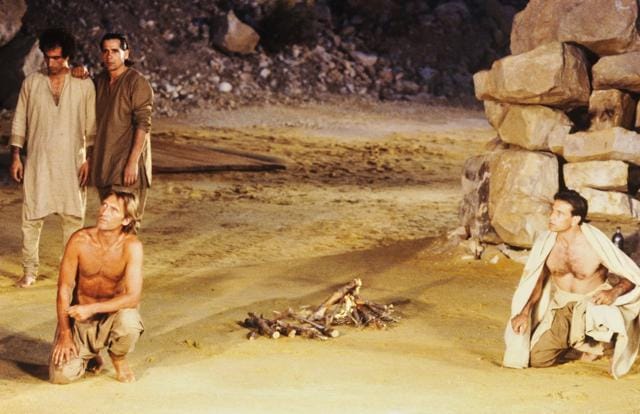
Le Mahabharata toured worldwide between 1985 and 1989. However, the production, in its entirety, never came to India.
Thirty years on, Brook, Carrière and screenwriter Marie-Hélène Estienne are revisiting the old text for a sequel called Battlefield. Here, the survivors of the great war try to make sense of the horrors they have experienced and perpetrated. The production will open in Mumbai this weekend.
The revival
Battlefield premiered in February 2016 at Brook’s theatrical home, Théâtre des Bouffes du Nord, Paris, which he has been running for over 30 years. Brook (now 90) has co-directed the play with Estienne, who assisted him during le Mahabharata. As Estienne puts it, “We’ve carried the ancient text in our hearts for four decades”.
For Brook, the idea of reviving the epic came from the desire to revisit the ending. “We wanted to focus on the devastation the war left behind: the coming of kali yuga (dark age) and the irrelevance of power when the earth, as we know it, has been destroyed. We had only fleetingly touched upon these aspects back then. Battlefield will be the entire discourse,” says Estienne.
With the focus on just one section, the cast has shrunk to four members (actors Carole Karemera, Jared McNeill, Ery Nzaramba and Sean O’Callaghan), and one musician — Japanese percussion artist Toshi Tsuchitori — who also composed for le Mahabharata, after spending years in Shantiniketan, West Bengal to understand Rabindra Sangeet.
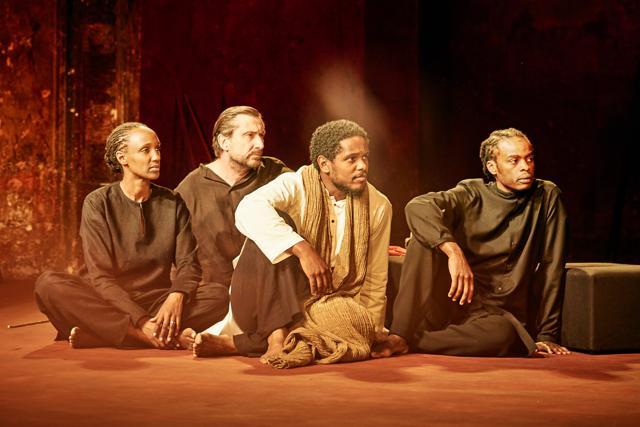
The lone ranger
In keeping with Brook’s tradition of working with multinational actors, the four cast members in Battlefield, too, belong to different countries. Estienne says, “Peter believes his work needs to resonate with a multicultural audience. And that culture is just a fragment of a larger, incomplete social jigsaw puzzle.”
Not surprisingly, for le Mahabharata, the 25 member cast was chosen from 16 countries, with just one Indian actor: dancer and Padma Bhushan recipient, Mallika Sarabhai, who played Draupadi. Though initially uncertain about associating with the play — she couldn’t speak French, the primary language of the play — she says she was eventually convinced by Brook’s minimalist interpretation.
READ MORE: Mallika Sarabhai travels back in time to the sets of le Mahabharata’s
“Peter’s mastery lies in the fact that his work is open-ended. He leaves space for interpretation by both the cast and the audience,” says Sarabhai. “I remember being blown away by his interpretation of the Mahabharata. He understood the issues of misogyny, inequality, power lust and the impending threat of a nuclear war, used as subtext in the Mahabharata. These affect everybody, irrespective of cultural background,” says Sarabhai.
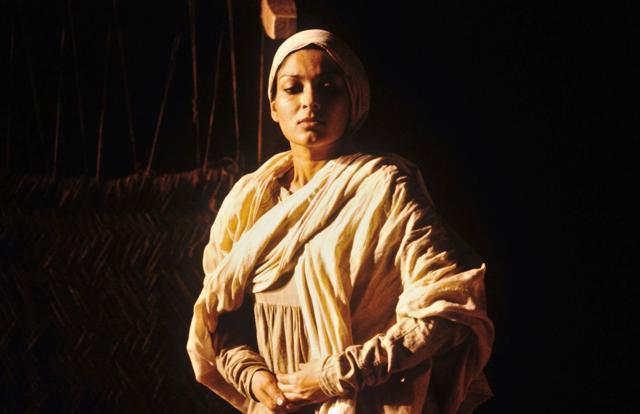
As the only Indian on set, she often found herself acting as a sounding board for her foreign co-stars. They would come to her seeking clarification on their characters. “I would, in turn, call my mother (veteran dancer, the late Mrinalini Sarabhai) and ask about author Iravati Karve’s version of the Mahabharata. She would send me photocopies of pages from the book.”
Access to all
Brook’s appeal also lay in his universality. He made no special attempt to capture Indian ethnicity. Even the visualisation was devoid of what Sarabhai calls “the Ram Leela approach: lustrous crowns, bushy moustaches and dramatic oomph”.
“Peter used symbology instead of obvious props. During Abhimanyu’s Chakravyuha sequence, Peter used a ladder. The character kept rotating it over his head to symbolise the circular war strategy. And for the sequence when Karna is defeated, he used a large cartwheel that symbolised the warrior’s broken chariot. Peter emphasised on storytelling instead of show,” says Sarabhai.
But despite the minimalistic approach, the play spanned over nine hours, and attention was paid to the smaller stories as well. Divided into three parts, the play opened with La Partie de Des (the dice game) which introduced the main characters, their aims, the role of the gods, and the growing discord between the Pandavas and the Kauravas. The second act, L’Exile Dans La Foret (the exile in the forest) traced the adventures of the Pandavas and Draupadi as they lived in the wilderness, procuring arms for the inevitable battle. Part III, La Guerre (the war) focused on the devastating combat that threatened the entire universe, ending in a gruesome massacre of mankind, and the Pandavas regaining their rights.
Controversy’s child
Sarabhai recounts that the best reactions came from the culturally unversed foreign audiences. Personally, she found them appreciative of her interpretation of Draupadi. “Women used to come backstage and tell me Draupadi inspired them to be assertive. For me, le Mahabharata sparked the beginning of the women-empowerment activism I am involved with till date,” she says.
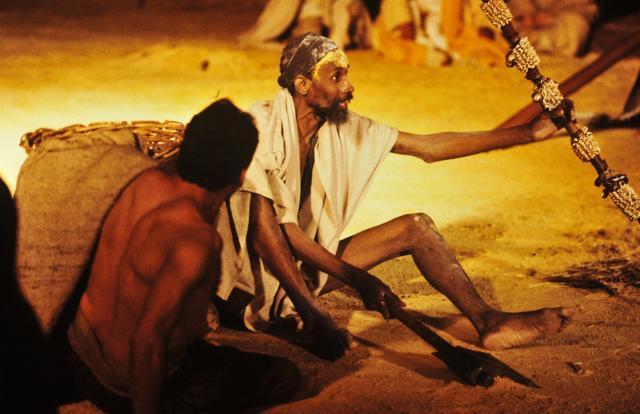
International acclaim notwithstanding, le Mahabharata never came to India, and Sarabhai blames the “rampant racism in the country” for it. “Parties took offence at the inclusion of African cast members to portray the Pandavas, who are are regarded as demigods in our society,” she says.
“The popular Indian TV series was also on air back then. But that version was again typically Indian: it focused on gods and magic. Peter’s version was more grounded in humanity. But the humanising of the gods created controversy. The reasons given to us were ridiculous: not wanting to ‘confuse’ Indian audiences, for instance,” adds Sarabhai.
Thirty years on, we have, hopefully, evolved. The Battlefield cast comprises foreigners and, yet, the sequel is among the most eagerly awaited productions to visit this year. “We are excited to come back to India and actually perform this time. We hope to share this extraordinary story, and bring to light the rich past of this country,” says Estienne.
READ MORE: 5 must-watch Indian adaptations of the Mahabharata
From Mahabharata to Battlefield: Revisiting the journey
1980: Musician Toshi Tsuchitori and Peter Brook visit India for the first time, to scout folk adaptations of Mahabharata, get a cultural understanding of the great epic, and study Indian folk music to incorporate in the play.
1984: The French script by Jean-Claude Carrière is finalised. Casting calls and preview shows take place throughout the year, in running for the opening night at Avignon.
1985: The play opens at Festival d’Avignon in a limestone quarry on the banks of the river Rhone.
1987: Peter Brook translates the French version to English. The Mahabharata is performed outside France for the first time, in Zurich, Switzerland, marking the beginning of their global tour. Shooting for the five-hour-long film adaptation by Brook, also commences.
1989: The film releases worldwide.
2013: Brook and Estienne start work on the script for Battlefield.
2015: The script is finalised, and preview shows begin in September.
2016: In February, Battlefield opens at the Théâtre des Bouffes du Nord in Paris.
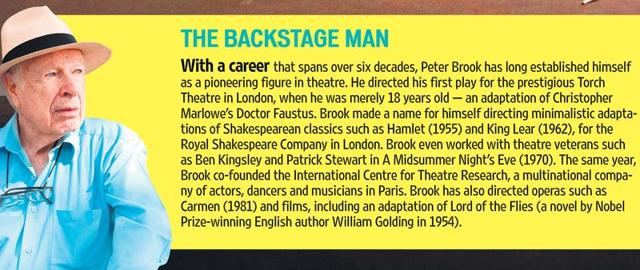
Don’t miss
Battlefield will be staged from March 5 to 12, at 7pm, at Tata Theatre, NCPA, Nariman Point
Call: 6622 3737
Tickets: Rs 500 onward




